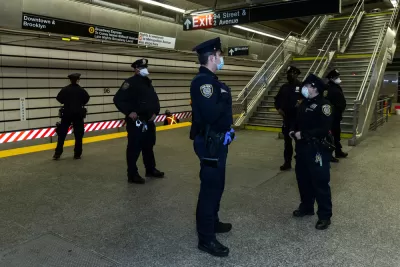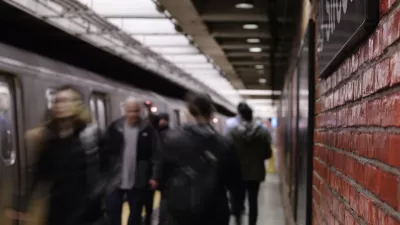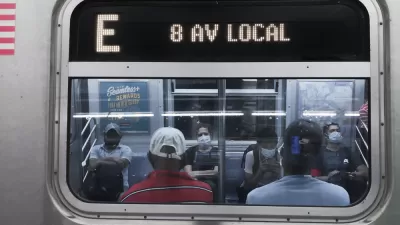Public transit systems in major U.S. cities are struggling to restore their image after rising crime rates led to heightened security concerns among riders.

In a detailed piece in Governing, Jake Blumgart outlines the security issues faced by mass transit systems around the country that are keeping some riders from returning. “There are many reasons why transit ridership has not returned after the pandemic. The major factor, most experts agree, is the rise of remote work for many white-collar professions.” But recurring COVID-19 infection surges and the fear of crime also play important roles.
Blumgart highlights New York City’s transit system, where “Mayor Eric Adams won his election with promises to save New York and its subways through a judicious application of law and order.” Now, six months after Adams took office, “Conservatives feel that Adams hasn’t put enough officers in the subway system and is too focused on social services as an answer. Progressively inclined activist groups argue that while they are not anti-police, overly broad orders to crack down on minor offenses are oppressive and likely to disproportionately target Black riders.”
Blumgart describes the challenges faced by the Adams administration and other city leaders in balancing public safety with equity and efforts to improve social services and housing options for people experiencing homelessness. “As transit agencies face fiscal realities borne of fare losses, they must also confront an existential question of public order alongside the law enforcement institutions that are suffering their own legitimacy crisis.”
As Blumgart writes, “New York is the Democrat-dominated city most publicly struggling with this tangled knot of policy questions. But all of the nation’s big cities will have to figure out how, or whether, they will have their police maintain the bright lines of conduct on their buses and trains.”
FULL STORY: Progressive Cities Have a Public Order Problem on Mass Transit

Alabama: Trump Terminates Settlements for Black Communities Harmed By Raw Sewage
Trump deemed the landmark civil rights agreement “illegal DEI and environmental justice policy.”

Study: Maui’s Plan to Convert Vacation Rentals to Long-Term Housing Could Cause Nearly $1 Billion Economic Loss
The plan would reduce visitor accommodation by 25% resulting in 1,900 jobs lost.

Planetizen Federal Action Tracker
A weekly monitor of how Trump’s orders and actions are impacting planners and planning in America.

Waymo Gets Permission to Map SF’s Market Street
If allowed to operate on the traffic-restricted street, Waymo’s autonomous taxis would have a leg up over ride-hailing competitors — and counter the city’s efforts to grow bike and pedestrian on the thoroughfare.

Parklet Symposium Highlights the Success of Shared Spaces
Parklets got a boost during the Covid-19 pandemic, when the concept was translated to outdoor dining programs that offered restaurants a lifeline during the shutdown.

Federal Homelessness Agency Places Entire Staff on Leave
The U.S. Interagency Council on Homelessness is the only federal agency dedicated to preventing and ending homelessness.
Urban Design for Planners 1: Software Tools
This six-course series explores essential urban design concepts using open source software and equips planners with the tools they need to participate fully in the urban design process.
Planning for Universal Design
Learn the tools for implementing Universal Design in planning regulations.
Caltrans
Smith Gee Studio
Institute for Housing and Urban Development Studies (IHS)
City of Grandview
Harvard GSD Executive Education
Toledo-Lucas County Plan Commissions
Salt Lake City
NYU Wagner Graduate School of Public Service





























